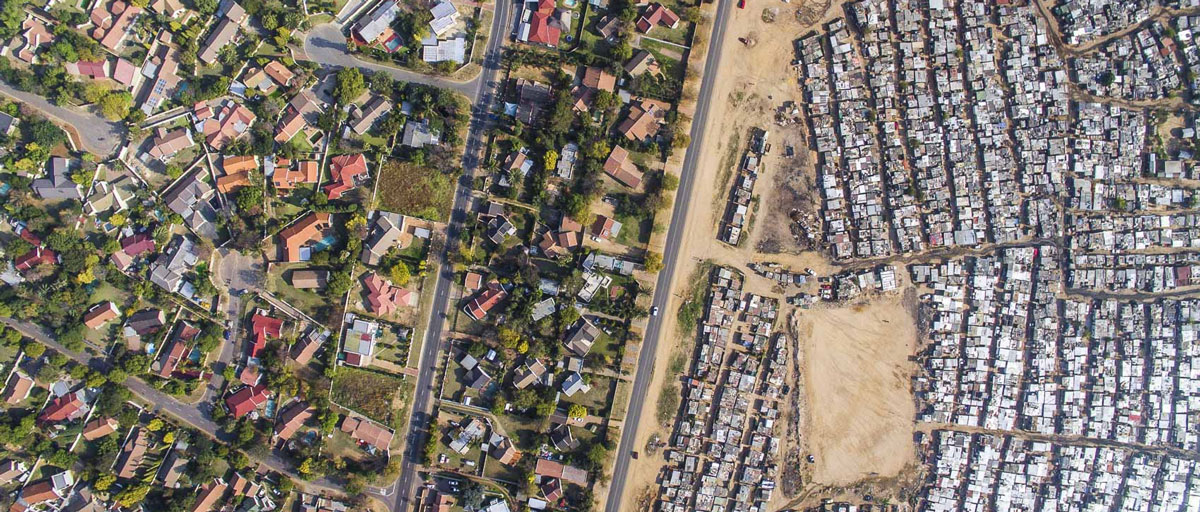CAPE TOWN'S WATER MANAGEMENT
Life after Day Zero: how Cape Town can adapt to climate change while also addressing inequality
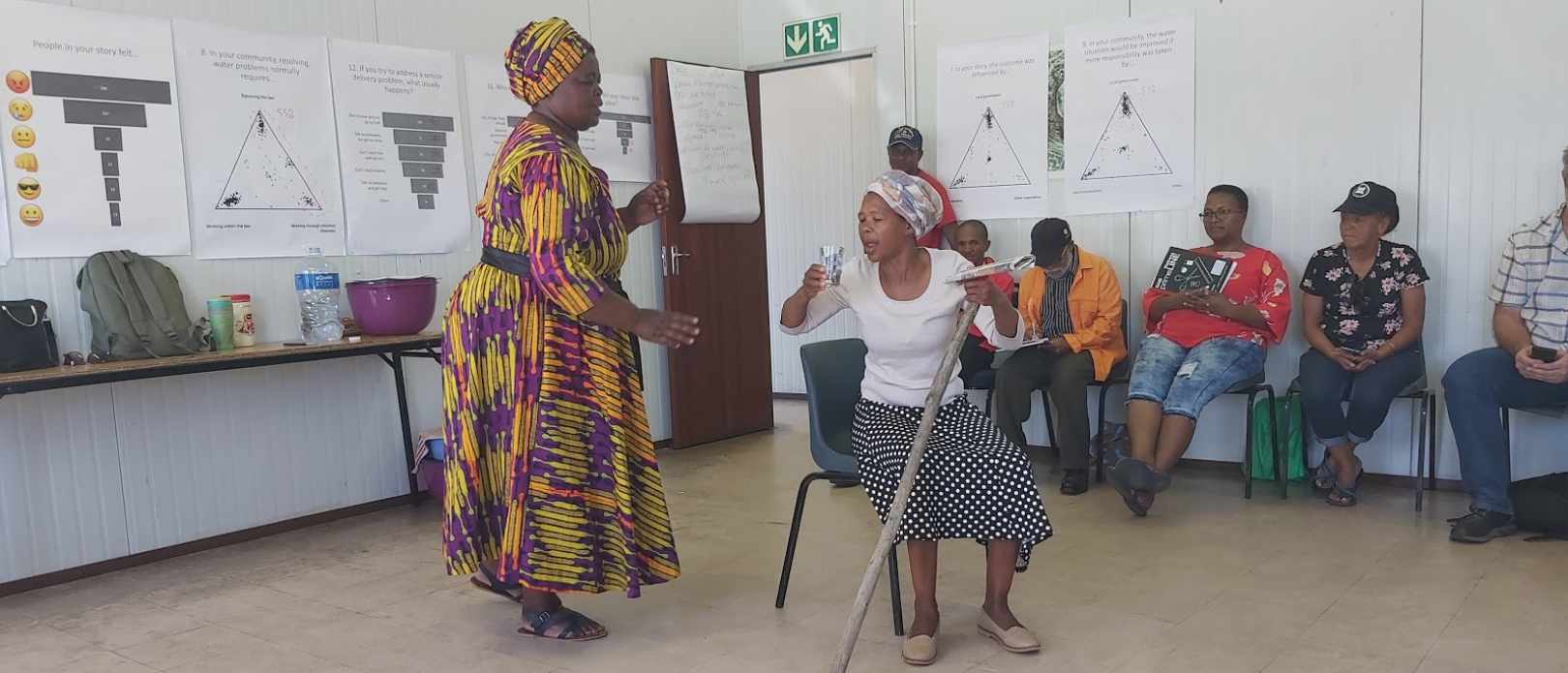
Dealing with intense uncertainty around water use is not new for a large section of Cape Town’s residents. Pictured, two Water Caucus members acting out a scene about common water issues to an audience of community members, invited to hear about the findings of the research project. Photo by J. Enqvist
After the scare in 2018, ramped up efforts to waste less water came at a cost to the city’s most vulnerable. Researchers and community activists gave these marginalised communities a voice
- Many living in Cape Town's sprawling informal settlements have been struggling for years with watercuts, leakages and sometimes no direct water access
- Reliable data on people’s living conditions is difficult to obtain
- One way to help adapt interventions to the conditions of informal settlements is by drawing on the knowledge of pre-existing, locally run community initiatives
THE RIGHT TO WATER: After several years of drought, by early 2018 Day Zero in Cape Town was fast approaching. The dams were almost empty and the world was holding its breath for the moment when the city at the foot of Table Mountain would have to turn off the taps to households and businesses, and residents would instead be forced to queue for their daily ration at municipal distribution points.
In the end Day Zero never came. Rainfall gradually started to improve, but more importantly the city firmly reduced and kept water use at around two thirds of pre-drought levels. This went on until October 2020, when the water levels in Cape Town’s dams finally bounced back to pre-crisis levels.
But even though disaster was averted, dealing with intense uncertainty around water use was not new for a large section of Cape Town’s residents.
Complex realities
Many living in the city’s sprawling informal settlements had been struggling for years with watercuts, leakages and sometimes no direct water access at all - a legacy of segregation imposed by South Africa’s Apartheid policies, as well as the continued failure of the City of Cape Town to address the needs of a growing population of poor residents.
Johan Enqvist is a researcher at the Stockholm Resilience Centre and University of Cape Town who has spent the last ten years working on urban sustainability issues.
Achieving water justice in cities like Cape Town requires interventions that grasp the complex realities on the ground.
Johan Enqvist
But this is no easy task. Reliable data on people’s living conditions is difficult to obtain, especially in rapidly growing cities in the south.
In addition to this, many of the city’s interventions to address inequality and improve access to water services rely on technical solutions that ignore or even exacerbate the complex challenges of living in informal settlements and crowded homes.
For example, in the 2000s the city started installing water management devices in selected households to comply with national requirements to conserve water resources and guarantee supply for those who could not pay their debts. By cutting off supply after 350 free litres per day, the devices would help households detect leaks and avoid high water bills.
The devices had impressive results, but created new problems for households that did not fit to the model of a suburban middle class home.
“The 350 litre cut-off is based on a household of four, but many low-income dwellings house extended families and tenants renting rooms or backyard shacks,” explains Enqvist.
“Once their allocation was used up, the devices would quickly cut off water supply, leaving more than just a family of four without water”.
The problem was further exacerbated during the crisis when device installations were ramped up. This saw increasing complaints about inadequate information on how they worked and when water would return.
Many community organizations and activists came to view the devices as a violation of vulnerable residents’ right to water.
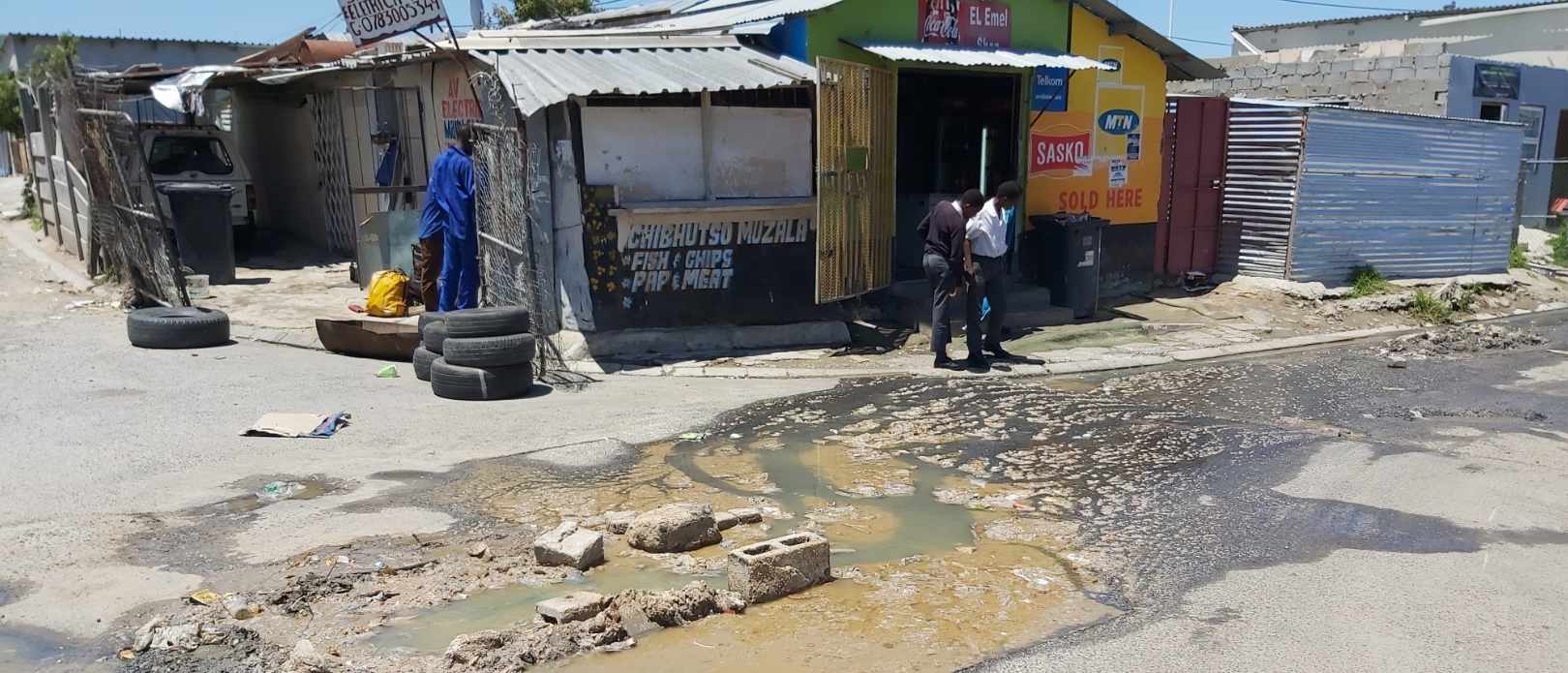
In Dunoon, an informal settlement in northern Cape Town, burst or blocked pipes often cause sewage to leak out onto the streets. Photo: J. Enqvist
Stories of water struggles
One way to help adapt interventions to the conditions of informal settlements is by drawing on the knowledge of pre-existing, locally run community initiatives.
There are benefits to this too. Studies from cities in Ghana and Malawi show that involving residents from informal settlements helps promote water justice through improving legitimacy, public awareness, local empowerment, accountability and sustainability.
In 2018 Enqvist and University of Cape Town researcher Gina Ziervogel met with the volunteer-run Western Cape Water Caucus, a community-based organisation working on water rights issues across several Cape Town townships.
Made up of township residents itself, the Water Caucus knew all about the kinds of struggles residents faced in their daily lives. But the leaders expressed frustration at not being able to influence city officials to acknowledge and address the problems in their communities.
Enqvist and Ziervogel were eager to understand more about the nuances of Cape Town’s water scarcity and help build capacity in local communities, and the Water Caucus wanted to develop better ‘evidence’ to support their arguments when communicating with city officials, as well as acquire skills to collect such evidence themselves.
This transdisciplinary approach, where researchers and citizens work together collaboratively by drawing on a mix of scientific and local expertise, generates action, problem management and capacity-building. Citizens are involved not only as informants but also as partners in problem identification, research design, data collection, and analysis of findings.
Using a tool called Sensemaker, the researchers and Water Caucus “activist researchers” co-designed the methodology together, and the activist researchers set out to collect stories of water struggles from the township residents.
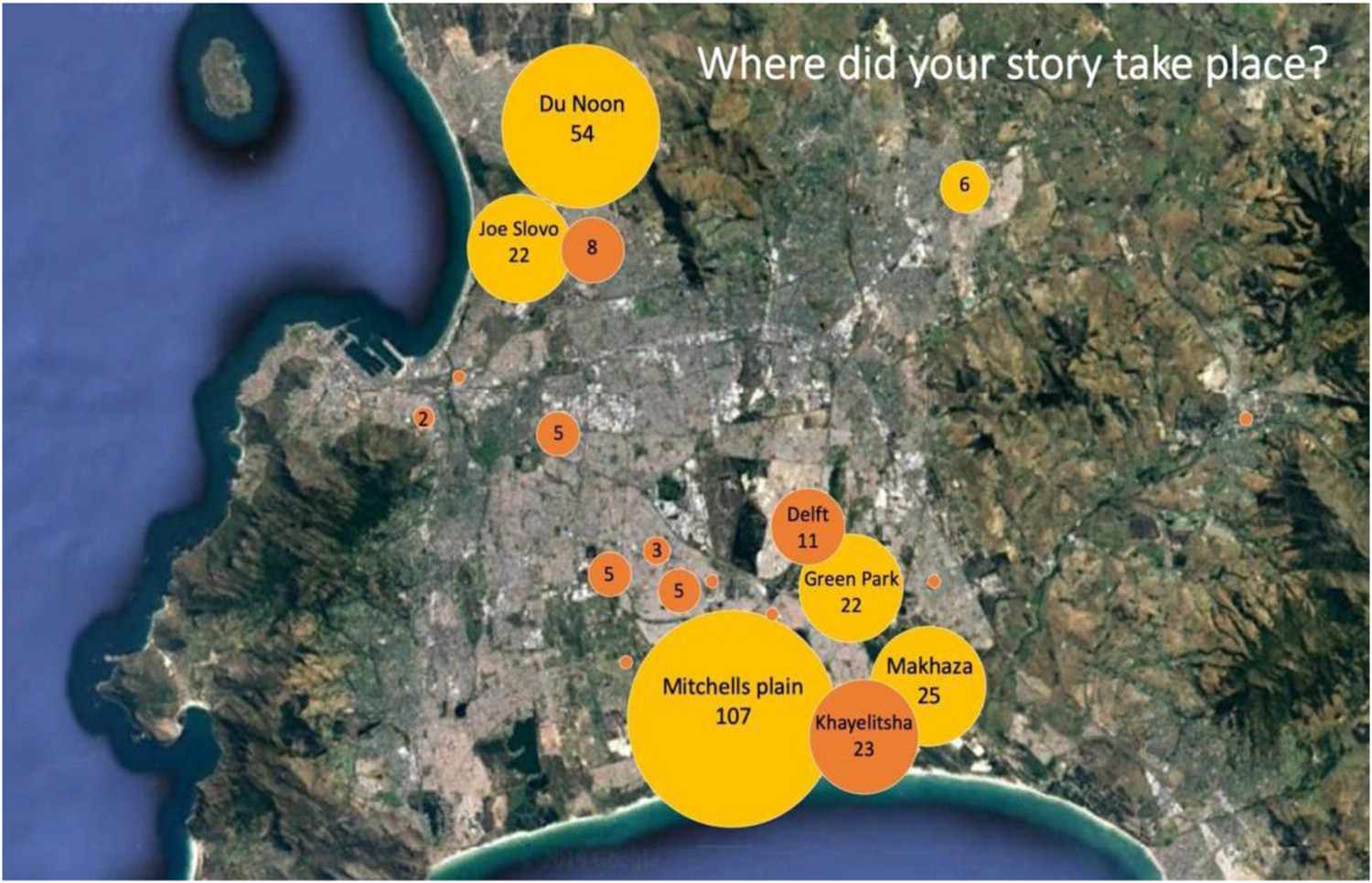
Water Caucus members collected 311 stories from the neighbourhoods where they live (yellow discs) and other low-income areas around Cape Town. Figure from Enqvist et al. 2020.
300 stories from the ground
To ensure wide participation, stories were collected on paper or through a smartphone app which was available in English, isiXhosa and Afrikaans.
In total over 300 stories were collected, providing detailed nuance to the issues facing residents in the townships, and showing overwhelming frustration with the municipality’s inability to address leaking pipes, faulty bills and poor sanitation.
Later on, the activist researchers extracted key narratives from the findings through preparing short role plays to illustrate the main issues. These skits, relying in part on posters with visualizations of quantitative data produced by the scientists, became the main tool to share the project findings with city officials and residents of the researched neighbourhoods.
As one activist explained, it was an empowering process:
In the past, we had heard stories, but they weren't documented. But now we have them documented, so we can use them to support our advocacy.
Confronting power dynamics
Learning from their experience in Cape Town’s townships and the novel collaboration with non-academic partners, Ziervogel and Enqvist say that transdisciplinary approaches are critical for addressing complex societal problems.
"Through considering diverse sources of knowledge and knowledge systems, capacity building can start to confront inequalities and shift dominant power dynamics," says Enqvist.
And how did the city officials respond?
One later stated:
I actually came out of it on a high. It was such a good encounter, such a positive encounter. I felt that the way the community expressed themselves was clear but not attacking. That was really positive for me.
Enormous benefits
Back in Cape Town, water levels are doing alright for now, but the harsh reality of a changing climate is looming in the not so distant future. So what are the next steps for ensuring fair and equitable adaptation policies?
Enqvist says their work in the townships highlights the enormous benefits of empowering previously excluded actors to claim a spot at the negotiating table, as well as learning the value of substantiating their arguments in a way that municipal partners can more easily understand and value.
"There is an urgent need for policymaking to include more guidance and support for these kinds of community-level transdisciplinary processes. Only then will we see truly transformative adaptation," he concludes.
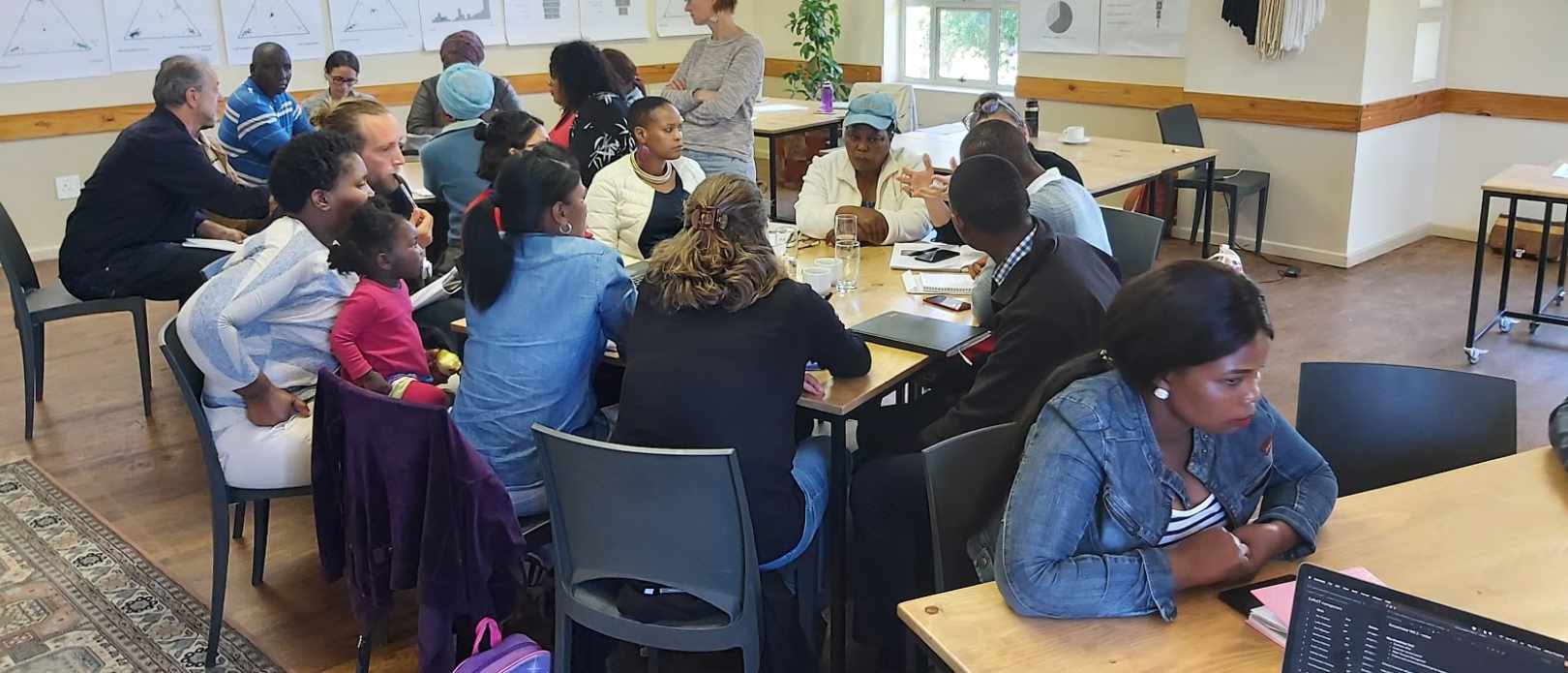
The study’s findings provided a useful platform for constructive discussions between representatives from Cape Town and the community activists involved in the research. Photo: J. Enqvist
This story is based on two publications investigating water equality issues in Cape Town, South Africa:
Enqvist, J., Ziervogel, G., Metelerkamp, L., van Breda, J., et.al. Informality and water justice: community perspectives on water issues in Cape Town’s low-income neighbourhoods. 2020. International Journal of Water Resources Development, pp.1-22, doi.org/10.1080/07900627.2020.1841605
Ziervogel, G., Enqvist, J., Metelerkamp, L. and van Breda, J., 2021. Supporting transformative climate adaptation: community-level capacity building and knowledge co-creation in South Africa. Climate Policy, pp.1-16, doi.org/10.1080/14693062.2020.1863180
